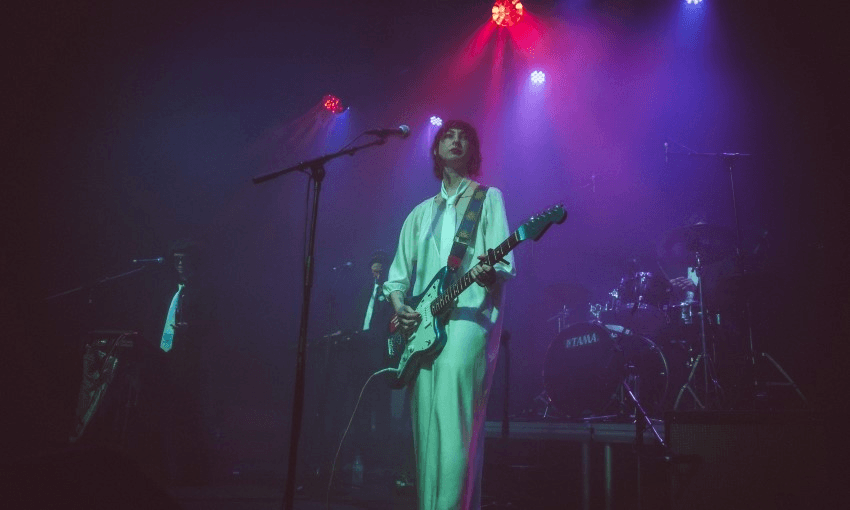If a song demands it, I just ask for quiet in the same way I would ask a friend for a hug. I risk looking like a twat every time, but I’ll take that on the chin if it means enhancing the collective experience, writes musician Vera Ellen.
This story includes references to suicide. Please take care.
I’m no stranger to a noisy audience. Since I was 16 years old, I’ve used my high but growly voice to battle against the murmurs of a tipsy bar crowd. At times, there was something exciting about it, a challenge, me against them. I thought of the audience as an entity to fight. Going on stage was a pitiless war and, as a young woman, it would take twice the effort to win them over. I held dear to the belief I would one day be a commanding enough performer to silence the whole damn room.
Ten years later, I began touring my sophomore album Ideal Home Noise. I was on stage gearing up to perform a song called ‘Broadway/Junction’, which details a visceral episode of suicidal ideation. It requires me to dig deep without choking up. I took a deep breath, considering the vulnerability and perhaps utter stupidity of going there with a room full of virtual strangers. I sang the first few lines but couldn’t hear myself above the increasingly loud chatter. With only my voice and guitar present, every laugh and murmur was amplified and swiftly it all became rather ugly. So I just stopped.
“Hey. Could you please stop talking? This song is really difficult for me to sing. I’m just gonna wait for you to be quiet before I continue.”
Slowly, the voices trickled off and the room fell silent. The kind where you could hear a pin drop. Something magic happened. Some illusion had been shattered, a wall had fallen between us and a tangible presence connected everyone in the room and the music together. After the show, I was thrown by the resounding feedback, thanking me for speaking up. I reflected on my own tribulations as a show attendee, where a sensitive moment was ruined by some drunken folks with seemingly no awareness of the artist or other people around them who really wanted to listen. I’ve felt viscerally angry at the complete lack of respect and care afforded in those moments, frustrated someone could be robbed of emotional release in the name of poorly timed water cooler chat. It got me thinking about my duty as an artist to facilitate the energy in the room. It reshaped how I view performance. I had been conceptualising it wrong. Maybe it didn’t have to be war. These days, if the song demands it, I just ask for quiet in the same way I would ask a friend for a hug. I risk looking like a twat every time, but I’ll take that on the chin if it means enhancing the collective experience.
If at this point you’re feeling enraged that some entitled artist would dare tell you, a ticket buyer, how to behave when you have spent your hard-earned money on the show (which is no small feat in this economy), I promise I’m not here to suck your fun, or to say you’re not entitled to let loose and have a good time. I’m just asking for a little discretion. There is an abundance of live music where banter and general audience commotion contribute to the overall ambience and excitement of the show. I love being immersed in an unruly crowd, a friendly shove and some accidental beer spillage, all in good fun. But what about when the artist is baring their soul with a single guitar? Can we respect them and those around us enough to pipe down for a few minutes?
It’s difficult to have this conversation without mentioning the significant period when we went entirely without live music during the Covid-19 lockdowns. I do wonder what effect this may have had on us as showgoers. Do we behave differently in crowds now? Maybe we get too excited or too overwhelmed? Perhaps we’ve forgotten how to be together. Either way, it’s high time we re-evaluate. When we enter a space with a group of people who paid the same as us for a ticket, what do we owe each other? What are our ethics when it comes to audience etiquette? Can we attend shows with an openness to be moved, whether that be to silence or otherwise?
I’m not claiming to be perfect. Who hasn’t been hushed at a show mid-catch-up with some distant acquaintance? In those moments, we may feel invisible. The spotlight is on the performer, and we assume the role of the observer. We don’t connect how our drunken exchange could affect those around us, let alone the person on stage. There is a disunion between the artist and the audience. So, whose responsibility is it to change this? Well, if we truly want a collective experience then, aren’t we all in part responsible? I’m calling for less separation between the artist and the audience – a culture that fosters a true feeling of solidarity, the kind you will remember in years to come. Where the artist can leave feeling uplifted and encouraged and the audience can leave feeling reinvigorated and spirited. A favouring of the collective experience above the individual one.
So if you find yourself at a Vera Ellen show and you hear the words “shut it” reverberating out of the PA, just know, this is not a declaration of war but rather, an artist’s plea.

